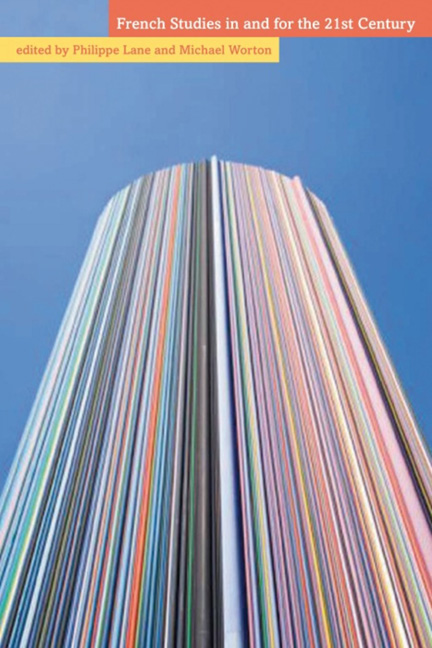Book contents
- Frontmatter
- Contents
- Notes on Contributors
- Foreword
- Foreword by His Excellency
- Part I: Contextualisations
- Part II: Research and Public Engagement Strategies
- Part III: The Place of Women and Gender in French Studies
- Part IV: The Place of Literature
- Part V: The Place of Linguistics in French Studies Today
- Part VI: Theatre, Cinema and Popular Culture
- Part VII: Area Studies, Postcolonial Studies and War and Culture Studies
- 16 An Area Studies Approach in European and Global Contexts: French Studies in Portsmouth
- 17 French Studies and the Postcolonial: The Demise or the Rebirth of the French Department?
- 18 The Development of War and Culture Studies in the UK: From French Studies, Beyond, and Back Again
- Part VIII: Adventures in Language Teaching
- Appendices. Addresses to the Future of French Studies Conference
16 - An Area Studies Approach in European and Global Contexts: French Studies in Portsmouth
from Part VII: Area Studies, Postcolonial Studies and War and Culture Studies
- Frontmatter
- Contents
- Notes on Contributors
- Foreword
- Foreword by His Excellency
- Part I: Contextualisations
- Part II: Research and Public Engagement Strategies
- Part III: The Place of Women and Gender in French Studies
- Part IV: The Place of Literature
- Part V: The Place of Linguistics in French Studies Today
- Part VI: Theatre, Cinema and Popular Culture
- Part VII: Area Studies, Postcolonial Studies and War and Culture Studies
- 16 An Area Studies Approach in European and Global Contexts: French Studies in Portsmouth
- 17 French Studies and the Postcolonial: The Demise or the Rebirth of the French Department?
- 18 The Development of War and Culture Studies in the UK: From French Studies, Beyond, and Back Again
- Part VIII: Adventures in Language Teaching
- Appendices. Addresses to the Future of French Studies Conference
Summary
In the 1970s, staff in the School of Languages and Area Studies (SLAS) at Portsmouth Polytechnic (as it was then) decided to develop a new type of language degree. At that time, the traditional model was the ‘lang and lit’ degree programme. Students who wanted to study languages were more or less obliged to combine the study of their chosen language(s) with the study of (mostly) the literary classics of that country. There were a few exceptions: York University, for example, offered programmes in language and linguistics, Salford and Bath specialised in translation, while Aston offered students the opportunity to combine language study with business administration. But the vast majority of language students took a ‘lang and lit’ degree.
It was against this background that Portsmouth, along with a small number of other UK higher education institutions, sought to break away from the traditional model and develop a new type of language degree – the ‘language and area studies’ degree programme – that would combine language study with the study of the history, politics, economy, society and culture of the country, or countries, in question. The new approach was to be resolutely multi-disciplinary and was essentially, but not exclusively, rooted in the social sciences.
Research-informed Teaching
The pioneers of this new approach recognised from the outset the importance of research. This was essential, first, for the development of an intellectual framework for the delivery of the new degree programmes. What were the implications of multidisciplinarity for curriculum development and delivery? Which were the key disciplines that should underpin an area studies approach and how could they be combined effectively? Was genuine interdisciplinarity, as opposed to multidisciplinarity, a possible and desirable objective within an undergraduate curriculum? These were some of the key questions that pioneers of the area studies approach sought to address. Second, there was a need for up-to-date, cutting-edge, interdisciplinary research to underpin and inform the teaching on these new degree programmes.
- Type
- Chapter
- Information
- French Studies in and for the 21st Century , pp. 197 - 206Publisher: Liverpool University PressPrint publication year: 2011



